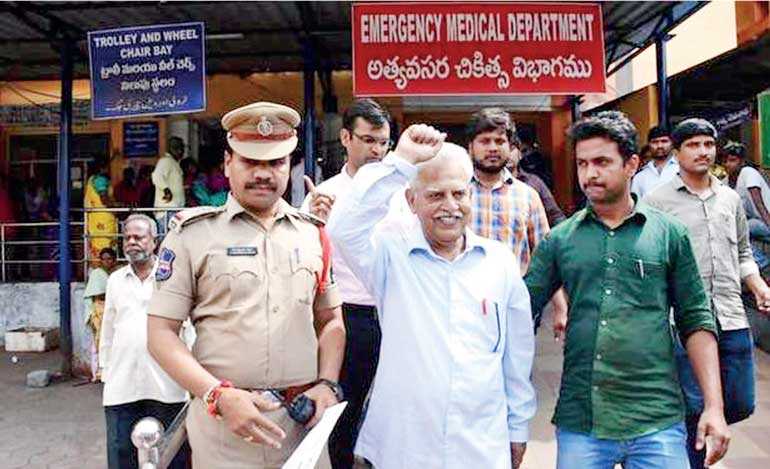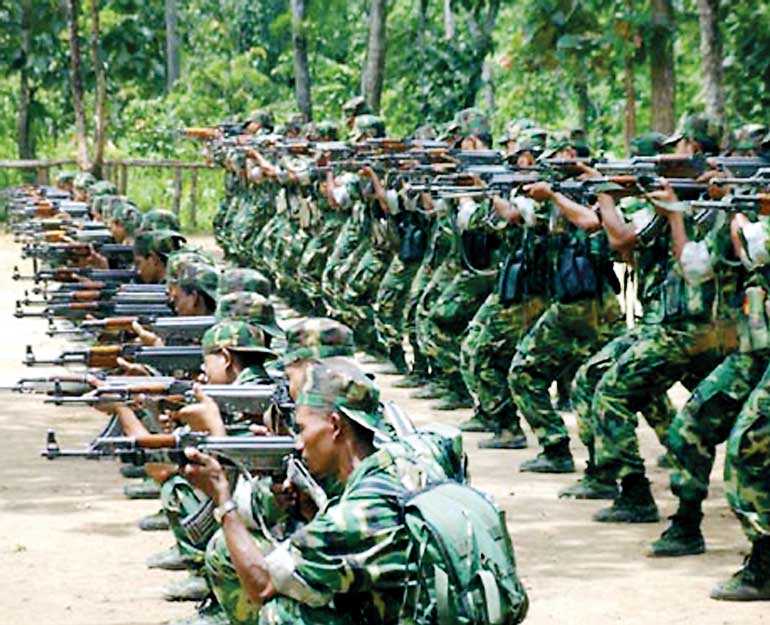Wednesday Feb 25, 2026
Wednesday Feb 25, 2026
Saturday, 1 September 2018 00:00 - - {{hitsCtrl.values.hits}}

 A number of inter-related issues are entangled in the arrest of some top left-wing intellectuals, and the raids conducted in the houses of several human rights activists across India on Tuesday.
A number of inter-related issues are entangled in the arrest of some top left-wing intellectuals, and the raids conducted in the houses of several human rights activists across India on Tuesday.
Among those arrested were the noted Telugu poet Varavara Rao, lawyer Sudha Bharadwaj, and human rights activists Arun Fereira, Gautam Navlakha and Vernon Gonsalves. They were said to be members of the Communist Party of India (Maoist) an amalgam of Maoist parties which came into being in September 2004.
The charge against them was that they had instigated the violence which marked an event involving the oppressed (Dalit) caste of Mahars in Bhima-Koregaon near Pune in Maharashtra State on New Year’s Day.
However, on a petition filed by leading academics Romila Thapar, Devaki Jain, Prabhat Patnaik and Satish Deshpande, the Indian Supreme Court on Wednesday asked the Maharashtra government to keep them under “house arrest” till 6 September. While doing so, the court also condemned the arrests saying that “if the voice of dissent is gagged, the pressure cooker will burst”, leading to the destruction of the whole system.
Reacting to the Supreme Court’s order, the Indian Minister of State for Home Affairs Hansraj Ahir said the Bhima Koregaon violence was a serious blow to the nation and Constitution. “The plot of igniting caste tensions is out in the open now and police are taking action,” Ahir added.
Struggle of Mahars and Dalits
The Mahars are classified in the Indian socio-political lexicon as “Dalit” or an oppressed caste which was earlier considered “untouchable”. In Maharashtra, there has been a perpetual conflict between the Marathas and Brahmins on the one hand and the Mahars on the other.
In the Koregaon battle of 1 January 1818, a small force of Mahars competently led by British officers of the East India Company’s army, had defeated a huge army of Marathas led by the Brahmin rulers of Maharashtra. The defeat had sounded the death knell of the Brahmin-led Maratha Empire in India. Ever since, the Mahars have considered the victory at Koregaon as a victory against their traditional oppressors, the Marathas and Brahmins.
No wonder, the annual commemoration of the event tended to lead to tension between the Dalits and the Marathas, the dominant caste in Maharashtra.
With the advent of the Bharatiya Janata Party (BJP) as a national and State level power since Narendra Modi became Prime Minister of India in 2014, tension between Dalits and the upper castes has increased in many States in India including Maharashtra.
This is because the Hindutva ideology of the BJP does not entertain caste liberation movements challenging the upper castes as it considers such movements to be anti-Hindu and anti-national. It prefers to brush caste grievances under the carpet for the sake of Hindu unity to face a perceived challenge from world Islam and Christian evangelism.
Maoists’ involvement
The branding of the intellectuals and activists as “Maoists” wedded to the violent overthrow of the established government is significant in the context of the threat that the Indian State is facing in parts of Central, Western and Southern India from the regrouped Communist Party of India (Maoist). It is a successor of the old “Naxalite” movement.
The movement was described by former Indian Prime Minister Manmohan Singh as the “most serious threat” to India. According to former Indian Home Minister P. Chidambaram, 223 of India’s 626 districts are affected by Maoist violence. In Andhra Pradesh Maoist activity has diminished the State’s GDP by 12.5%.
The extortion rackets run the Maoists are said to be fetching them the equivalent of $ 300 million to 400 million a year according to Vishwa Ranjan, former Director General of the Chattisgarh State police. Chattisgarah is very badly affected by Maoist activity.
Big Indian companies operating in Maoist areas give millions of dollars as protection money. Even petty government officials cough up a part of their salary. According to Chidambaram, only a few of the Maoist leaders are truly motivated by ideology, the rest are criminals.

Issues Maoists feed on
However, it is undeniable that the Maoists have popular support as they take up the cause of the tribals of Central, Western and South India, who have been routinely exploited, first by the feudal lords under British rule and then by capitalists enjoying the support of the post-independence Indian State.
The British left tax collection to the semi-independent Indian princes and landlords called Zamindars. The Princes and Zamindars did nothing for their subjects but only collected high taxes using harsh measures. The peasantry in the largely forested Central India were tribals who were the lowest in the social hierarchy and also the poorest.
They were not in settled agriculture but in slash and burn subsistence agriculture which depended on the existence of the forest and their control over it. They were subject to the vagaries of the weather as a single drought would push them to the bottom.
Instead of encouraging settled and improved agriculture, the post-independence Indian governments continued the British policy of neglecting the tribal economy.
While neglecting agricultural development, governments encouraged big mining companies to exploit the mineral wealth in the area. This led to the displacement of the tribals and loss of forest for slash and burn cultivation. Even the cultivation and trade in Tendu leaves (the leaves used to cover the native Indian cigarette Beedi) were interfered with by urban traders in cahoots with government officials to the detriment of the tribals.
Exploitation and the resultant resistance came to light when the breakaway Naxalite or Maoist groups of the Indian Communist party took up their cause and unleashed systematic violence. According to government estimates, 7,000 people were killed in Maoist violence and State counter violence between 2005 and 2017, a third of them being innocent civilians.
While the State has been trying to put down Maoist violence with violence and has arrested radical urban intellectuals who take up the cause of the downtrodden, it has failed to address the basic issues which have been tormenting the tribals.
The last Congress government had introduced a rural employee guarantee scheme which put some money into the poor tribal’s pocket. But this scheme is not implemented properly everywhere due to the corrupt bureaucracy and sometimes due to local Maoist opposition also. In some places the Maoists fear that the scheme will erode their support base. However in some places the Maoists have helped implement the scheme properly.
Experts now suggest that the money to be paid to the rural workers be put into their bank accounts and not routed through corrupt officials. With everyone now encouraged to open a bank account and conduct money transactions only through banks, direct payment to the beneficiaries should be possible.